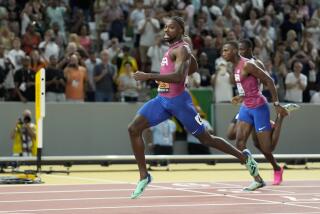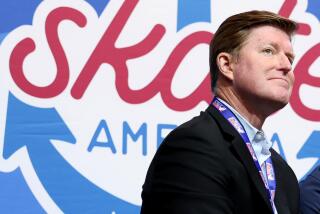Now He’s Rolling
- Share via
KEARNS, Utah — In his way, U.S. speedskater Chad Hedrick is as rebellious and outspoken as skier Bode Miller.
Hedrick has butted heads with his national sports federation and chosen to accept unapproved sponsorship money.
And he likes his play time.
He made a snap decision to switch from inline roller skating to speedskating on ice while sitting in a Las Vegas casino. Sometimes he’s late for practice because he’s, um, tired from the night before.
Hedrick makes bold statements. He is predicting a haul of five gold medals at the Olympics in Turin even though he’s only in his third year of competitive speedskating.
The thing is, Hedrick is backing up the talk. The 28-year-old from Spring, Texas, a region not noted for producing winter-sports athletes, has set three world records in the last year.
He will be the favorite in at least two Olympic events. And although it’s unlikely he will tie Eric Heiden’s record of five golds, it’s not impossible.
“And why dream small?” Hedrick said. “It’s my dream. Why shouldn’t I say it? If I fail, it’s on me.”
Unlike Miller, Hedrick has charmingly gone his own way. While some of his sponsorship patches were in conflict with USA Speedskating deals, Hedrick quietly negotiated his own contracts and has not accepted training or travel money from his national federation.
Hedrick hired his own coach, Bart Schouten, who also trains 2002 Olympic sensation Derek Parra, and has willingly fulfilled any public relations requests the federation has made of him.
Hedrick doesn’t hide his love of nightclubs or his enjoyment of an alcoholic beverage from time to time, but he hasn’t bragged about racing around the ice while “wasted,” to borrow a prime-time television quote from Miller.
“Look, if Chad were as bad as some like to say, he wouldn’t have accomplished what he’s accomplished,” Schouten said at last month’s U.S. nationals here. “The guy trains hard, he’s incredibly talented and immensely likable.”
Said Parra, Hedrick’s roommate and Olympic teammate: “Chad has a gift. If he enjoys himself too, so what? When it comes time to perform, he’s always at the line, ready to go. What he’s done in three years is amazing. When he’s got the international stage, people are going to say, ‘Wow!’ ”
Until he watched Parra at the Salt Lake City Olympics, Hedrick was considered the world’s best inline skater, having won more than two dozen world championships and 60 national championships. His parents own inline rinks in Spring, a Houston suburb, and Hedrick was wearing baby roller skates and toddling around the rink when he was 17 months old.
And when he grew up, the money wasn’t bad. He was earning well into six figures while still a teenager. He had a nice car, a nice time, a nice life.
“But, honestly,” he said, “I was getting a little bored, a little jaded. I need challenges and goals and most of those I’d taken care of in inline.”
Hedrick is not the first skater to change from wheels to blades and from concrete to ice. On this U.S. Olympic team alone, Parra, K.C. Boutiette, Joey Cheek and Jennifer Rodriguez are also former inline skaters. But none has been as immediately successful as Hedrick.
In 2004, only a year and a half into his transition, Hedrick won the world all-around title. Dutch skaters had owned that title for nine years, which isn’t surprising since, besides soccer, speedskating is the most popular sport in the Netherlands. And when Hedrick first began competing nationally, he noticed the technically superior Dutch skaters -- and the Norwegians and Germans -- snickering as they watched him.
“My stride wasn’t exactly perfect,” Hedrick said. “I was kind of choppy. I just tried to overpower the ice. So, OK, I figured, let them laugh. They don’t laugh much now.”
Instead, Schouten said, Dutch skaters now watch Hedrick’s training videos trying to find the secret in the Texan’s meteoric rise.
“But it’s no trick,” Schouten said. “It’s just hard work and supreme talent. Chad’s father was his inline coach and he really instilled a serious work ethic and competitive fire in the kid.”
Parra has nicknamed Hedrick “the Exception” because, Parra said, “He doesn’t exactly do things by the book. But a lot of us feed off his enthusiasm and confidence. He’s got his own ways of doing some things and just being around Chad makes me better.”
Hedrick has set world records in the 1,500-, 5,000- and 10,000-meter Olympic distances in the last year, as well as the 3,000-meter event, which isn’t skated at the Olympics. He will skate those three as well as in the 1,000 and a new event this year -- team pursuit.
Hedrick isn’t a sprinter and isn’t competing in the 500. Heiden swept the 500, 1,000, 1,500, 5,000 and 10,000 distances in 1980. Because he’s a member of the team pursuit, Hedrick will need to rely on teammates if he is to threaten Heiden’s record.
“Of course it will be difficult,” Schouten said. “It’s an incredible program to attempt and I admire Chad that he comes out and puts the pressure on himself. But it’s good for the sport.”
At the national championships, Hedrick predicted he would break the 10,000-meter world record. The race was the final event of the weeklong championships, but when it was time, Hedrick looked around, winked and did exactly what he said he’d do.
He has an easy way with the world. His smile, wide and bright, comes quickly. He is thoughtful as he speaks, choosing words well and making his points emphatically.
When Hedrick says that “moving onto the ice came easily to me,” it sounds truthful rather than boastful. He loves that the Europeans who act as if they own the sport now sputter at his quick path to the top. He respects Heiden’s accomplishments and says his quest to match the record stems from wanting to honor Heiden, not overshadow him.
“I’m going to have fun in Turin,” Hedrick said. “But I’m also going to win.”
Boast or truth? Hedrick laughs. The sound is all joy.
More to Read
Go beyond the scoreboard
Get the latest on L.A.'s teams in the daily Sports Report newsletter.
You may occasionally receive promotional content from the Los Angeles Times.






